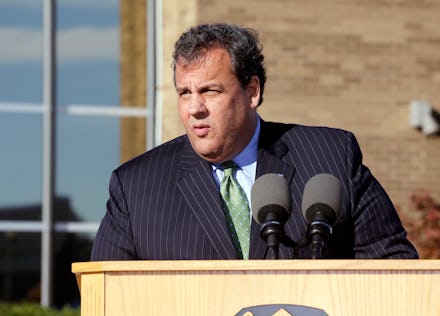Chris Christie 2016: Gay Marriage Decision is the Latest Sign He's Running

This past Monday, New Jersey Democratic Party leaders rejoiced. Governor Chris Christie’s administration withdrew its fight to appeal a court ruling legalizing same-sex marriage in the state. Newark Mayor and Senator-Elect Cory Booker married five same-sex couples at Newark City Hall. Assemblyman Tim Eustace of District 38, recently responsible for pushing the statewide ban on gay conversation therapy bill that passed in August, happily married his partner Thursday.
Although the Supreme Court officially deemed the Defense of Marriage Act unconstitutional last June, New Jersey remains only one of 14 states that recognize same-sex marriage,. The Christie administration’s decision to withdraw its appeal, which ultimately legalized same-sex marriage in New Jersey could either inspire a movement within the Republican Party toward greater acceptance, or merely serve as another campaign strategy for the 2016 presidential election. Which will it be?
Politicker NJ says a recent Rutgers-Eagleton poll shows an average of six out of 10 voters favor Christie for his “tough guy” attitude in this year's gubernatorial race. His entire campaign strategy orients around the concept of “strong leadership,” a slogan found on lawn signs and social media. Undoubtedly, the incumbent governor and current administration hold name recognition that Christie's opponent, Democratic State Senator Barbara Buono, does not yet have. Although Buono better fits New Jersey because of her stances on education reform, a fairly progressive and flexible Republican administration serves as an compromise for conventionally liberal state.
Therefore, Christie's move on same-sex marriage will pay off. Christie serves as a Republican in a traditionally blue state. His moderate conservative philosophy may be appropriate to his constituency, but if the governor pursues the Oval Office in 2016, the “real Christie” — politically unchanged by a national election or perhaps even more conservative — may become apparent.
The Governor’s public commentary on this month’s government’s shutdown further gives credence to the idea that Christie is planning to run a campaign on a national level. Not only has he become nationally renown for his job as governor, he is now attempting to establish himself as a figure who wants the government to comprise for the sake of progress. In a place where both parties cannot agree, Christie attempts to win over prospective voters by favoring compromise over party politics.
Christie has the potential to change the way the Republican Party thinks, acts, and is perceived by the public. His decision to end his battle against same-sex marriage recognition appears to be step one. The question may not be if the current governor is progressive, but rather, whether he will continue to be. Only time will tell.